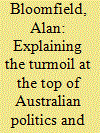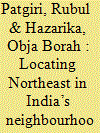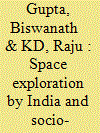|
|
|
Sort Order |
|
|
|
Items / Page
|
|
|
|
|
|
|
| Srl | Item |
| 1 |
ID:
148496


|
|
|
|
|
| Summary/Abstract |
The paper looks at the concept of political ‘hybridity’ within the broader framework of Pakistan’s domestic politics. Whilst analysing Pakistan’s domestic politics, most analysts tend to view the country’s political system as authoritarian and label it as a military dictatorship. Whilst this has been true for most of Pakistan’s history since it came into existence in 1947, it is also equally important to look at the role played by the more democratic elements of Pakistani society in politics, and the interactions that have taken place between the more democratic forces on the one hand, and the more authoritarian elements on the other. This paper moves away from traditional ways of viewing Pakistan’s domestic politics and focuses more on the grey areas, instead of viewing the country in black or white terms. In doing so, the paper has a strong focus on Ayub Khan’s concept of Basic Democracy.
|
|
|
|
|
|
|
|
|
|
|
|
|
|
|
|
| 2 |
ID:
148498


|
|
|
|
|
| Summary/Abstract |
Five Australian prime ministers have come and gone in the past five years. The turbulence at the top, however, is likely over because Malcolm Turnbull, the leader of the conservative Liberal Party, is likely to remain in the prime minister’s office for several years. This article first provides some background to the Australian political system before explaining why so prime ministers came and went between 2010 and 2015. It then considers the implications of all this for Australian foreign policy. The argument is simple: despite the constant personnel changes at the pinnacle of power there are actually few ‘deep’ differences between the two parties – or their leaders – in the realm of foreign policy. There are some differences, of course, so the final section considers the potential for changes in several policy-areas – climate change, national security, trade policy and asylum seekers – but any potential changes are judged likely to be minor and incremental. The article then finishes with consideration of what all of this means for India and, again, the conclusion is simple; it is likely to be ‘business as usual’ as Canberra tries to steadily improve the bilateral relationship in both security and economic terms.
|
|
|
|
|
|
|
|
|
|
|
|
|
|
|
|
| 3 |
ID:
148493


|
|
|
|
|
| Summary/Abstract |
This article, set in the tradition of analysing the domestic inputs to foreign policy, explores the interface of federalism and the making and execution of foreign policy in India by looking at six case studies drawn from the United Progressive Alliance UPA (2004–2014) and the National Democratic Alliance NDA-II (2014 onwards) periods. Although the Indian Constitution has vested the power to conduct foreign policy almost exclusively in the Union government, serious differences between the two layers of government in the Indian federation have never been unknown altogether. However, it is argued here that the twin developments of the 1990s, that is, rise of coalition governments at the central level and introduction of neoliberal reforms in the Indian economy, enabled States to deepen their footprints in the foreign policy arena. In conclusion, the article attempts a comparison of the two regimes’ performances in handling the issues concerned and asserts that instead of depending on ad hoc political management skills, these developments should be addressed through devising some new mechanism to achieve effective consultations between the Centre and the States on the foreign policy front.
|
|
|
|
|
|
|
|
|
|
|
|
|
|
|
|
| 4 |
ID:
148494


|
|
|
|
|
| Summary/Abstract |
India’s neighbourhood policy seems to be devoid of any strategy to integrate national interests with the concerns of border regions like Northeast India. India’s security-centric approach prevented a cooperative relationship from emerging with its neighbours, while a deeper and intense engagement with them would have benefitted India and helped solve many of the problems that Northeast India is facing today. However, the recent move by India under the Act East Policy to cultivate a much closer relationship with its eastern neighbours is full of possibilities to make India’s neighbourhood policy more accommodative and sensitive towards the needs of Northeast India. In the light of this, the proposed article intends to examine the nature of India’s neighbourhood policy, to assess its implications for the Northeast and finally, to examine whether the recent transnational engagements can initiate development of the Northeast by relieving it from its peripheral and landlocked status.
|
|
|
|
|
|
|
|
|
|
|
|
|
|
|
|
| 5 |
ID:
148495


|
|
|
|
|
| Summary/Abstract |
The article investigates Narendra Modi’s Bangladesh policy and India–Bangladesh relations under his regime. It challenges the conventional wisdom that when the Bharatiya Janata Party (BJP) and Awami League (AL) regime are in power, India and Bangladesh do not enjoy warm relations and argues the opposite. It contends that water issue and dynamics of domestic politics work as major challenges in forging India–Bangladesh relations. On the contrary, it also identifies opportunities to further strengthen the bilateral relations. It finds that there are a number of untapped potentials that need to be explored and be exploited. It is of greater interest for both India and Bangladesh to foster the bilateral relations based on mutual understanding, respect and reciprocity.
|
|
|
|
|
|
|
|
|
|
|
|
|
|
|
|
| 6 |
ID:
148497


|
|
|
|
|
| Summary/Abstract |
For the last 50 years, Indian Space Research Organisation (ISRO) has seen a tremendous development in the field of space science and technology. Outer space exploration in social programme (education, telemedicine, communication and information) and economic activities (agricultural forecasting, meteorological data, telecommunication and broadcasting) helped India grow faster. Over the past few years, India is also engaging with other countries, offering them the space science and technology for their overall development.
|
|
|
|
|
|
|
|
|
|
|
|
|
|
|
|
|
|
|
|
|